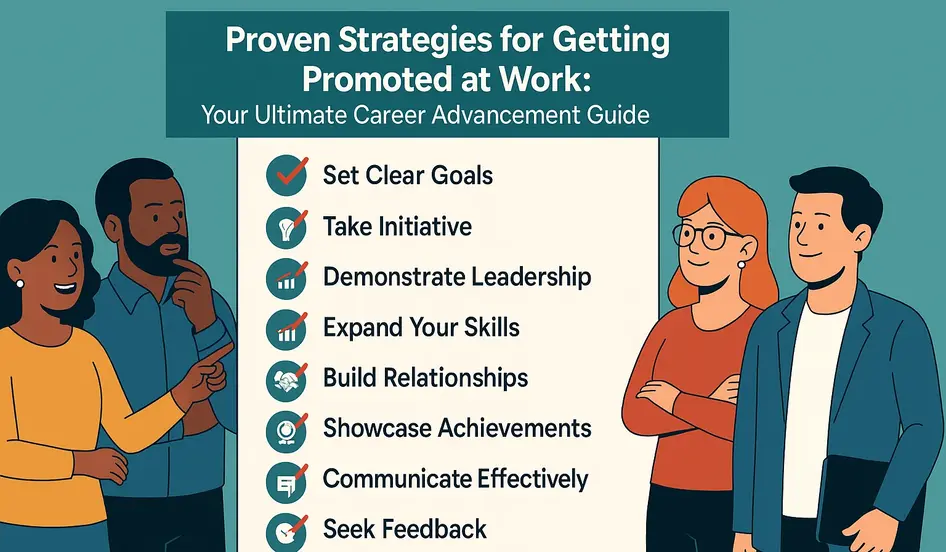Understanding Workplace Promotion Criteria
In today’s competitive professional environment, career advancement requires more than just showing up and doing the minimum. Organizations have specific criteria for promoting employees, and understanding these expectations is crucial for your professional growth. According to workplace experts, getting promoted at work requires a strategic approach that combines technical expertise with interpersonal skills.
Before pursuing a promotion, it’s essential to align your career goals with your company’s expectations. This alignment creates a foundation for sustainable career advancement and prevents future conflicts between your aspirations and organizational needs.
Mastering Your Current Role: The Foundation for Promotion
Exceeding Performance Expectations
The most fundamental strategy for getting promoted at work is consistently exceeding expectations in your current position. Promotion-worthy employees don’t just meet deadlines—they consistently deliver high-quality work ahead of schedule.
To position yourself for career advancement:
- Master your core responsibilities completely
- Consistently meet and exceed performance metrics
- Complete assigned tasks with minimal supervision
- Demonstrate reliability through consistent performance
Developing New Skills Proactively
In today’s rapidly evolving workplace, skill development is non-negotiable for getting promoted at work. Employers value employees who continuously expand their capabilities and stay current with industry trends.
Focus on developing both technical and soft skills:
- Identify skills valued at higher organizational levels
- Pursue relevant certifications and training
- Learn from colleagues in positions you aspire to
- Stay abreast of industry changes and innovations
- Apply new skills to current projects to demonstrate growth
Demonstrating Leadership Potential
Taking Initiative Beyond Your Job Description
Promotion-ready professionals don’t wait for assignments—they actively seek opportunities to contribute. This proactive approach signals to management that you’re ready for greater responsibility.
Effective ways to demonstrate initiative include:
- Volunteering for challenging projects
- Identifying and solving problems before they escalate
- Making thoughtful suggestions for process improvements
- Spearheading workplace wellness or improvement initiatives
- Supporting colleagues during high-pressure periods
Building Strong Workplace Relationships
Career advancement rarely happens in isolation. Building strong relationships across your organization creates a network of supporters who can advocate for your promotion.
To strengthen your professional relationships:
- Collaborate effectively with team members
- Develop connections across departments
- Handle conflicts professionally and constructively
- Seek mentorship from senior colleagues
- Offer support to colleagues during challenging periods
Communication Excellence: A Critical Promotion Factor
Articulating Your Value Effectively
Your contributions only impact promotion decisions if decision-makers are aware of them. Learning to communicate your achievements effectively is a crucial strategy for getting promoted at work.
Improve your professional communication by:
- Providing regular updates to supervisors
- Quantifying your contributions whenever possible
- Sharing credit appropriately with team members
- Asking clarifying questions to ensure understanding
- Adapting your communication style to different audiences
Handling Workplace Conflict Constructively
How you navigate workplace disagreements significantly impacts promotion decisions. Demonstrating conflict resolution skills shows management you’re ready for more complex responsibilities.
Effective conflict management includes:
- Addressing issues directly but respectfully
- Focusing on solutions rather than blame
- Maintaining professionalism during disagreements
- Seeking compromise when appropriate
- Learning from conflict situations to prevent recurrence
Strategic Career Planning
Aligning Personal Goals with Organizational Needs
Successful career advancement requires strategic alignment between your professional aspirations and your organization’s objectives. This alignment demonstrates your commitment to the company’s success.
To create this alignment:
- Understand your company’s strategic direction
- Identify how your role contributes to organizational goals
- Communicate your career aspirations to management
- Seek feedback on your development areas
- Create a structured career development plan
Persistence and Adaptability
Getting promoted at work rarely follows a linear path. Setbacks and redirections are normal parts of the career advancement journey. Demonstrating resilience through these challenges showcases your determination and adaptability.
Cultivate these qualities by:
- Maintaining motivation despite setbacks
- Adapting to changing organizational priorities
- Remaining flexible about promotion timelines
- Learning from unsuccessful promotion attempts
- Staying committed to continuous improvement
Hiring? Post Jobs for Free with WhatJobs
Are you an employer seeking promotion-ready professionals who understand what it takes to advance in today’s workplace? WhatJobs connects forward-thinking companies with talented individuals ready to contribute to your organization’s success.
FAQ: Strategies for Getting Promoted at Work
What are the most important factors managers consider when making promotion decisions?
When considering candidates for promotion at work, managers typically evaluate consistent high performance, leadership potential, problem-solving abilities, and interpersonal skills. They look for employees who not only excel in their current role but also demonstrate capabilities required at the next level. According to workplace research, managers are particularly impressed by professionals who show initiative, collaborate effectively with others, and align their work with strategic organizational goals.
How long should I expect to wait before getting promoted?
The timeline for getting promoted at work varies significantly depending on your industry, organization size, role, and performance. While some companies have structured promotion cycles (typically 1-3 years), others base advancement purely on merit and organizational needs. Rather than focusing exclusively on timing, concentrate on demonstrating promotion-worthy performance, developing relevant skills, and communicating your career aspirations to management. This proactive approach positions you favorably when promotion opportunities arise.
What should I do if I’ve been consistently performing well but haven’t received a promotion?
If you’ve been excelling in your role without career advancement opportunities, schedule a constructive conversation with your manager. Come prepared with documentation of your achievements, added responsibilities, and contributions to the organization. Ask for specific feedback on what’s needed for promotion and create a development plan addressing those areas. Sometimes, promotion delays relate to organizational factors beyond your control, so also consider whether your current workplace offers the growth opportunities you seek.
How important are soft skills compared to technical skills when seeking promotion?
Both technical expertise and soft skills are essential for getting promoted at work, but their relative importance depends on the level you’re targeting. For advancement into management positions, soft skills like communication, leadership, conflict resolution, and strategic thinking become increasingly critical. Research shows that while technical skills might get you hired, soft skills are often what get you promoted, especially beyond first-level management. The most promotion-ready professionals develop both skill sets simultaneously.






